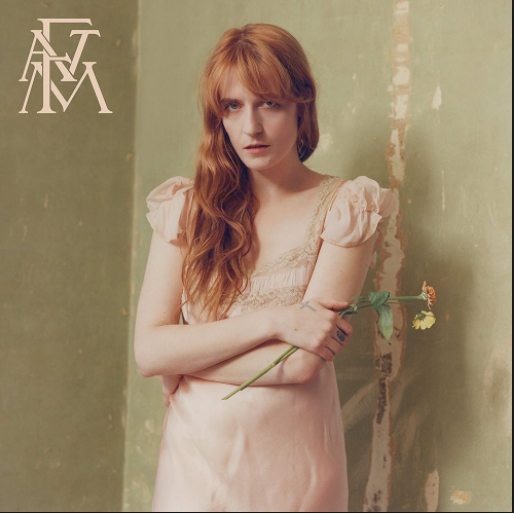Make Up Your Mind: Florence + the Machine’s “High as Hope”

“High as Hope,” Florence’s fourth studio album, is a deparature from the artist’s theatrical musical style.
July 12, 2018
Here’s what qualifies Online Editor-in-Chief Sophia Kontos to write about music: she can’t go 10 minutes without using Spotify, she devotedly follows NPR Music and she loves her headphones more than just about anything else. With these (really impressive) credentials, she will share her opinions about under-the-radar and alternative artists on her column “Make Up Your Mind,” named after one of her favorite Florence + the Machine songs.
Florence and the Machine makes music out of crushing loss and regret. Led by Florence Welch, this English band produces music that makes you want to dance (“Patricia” from “High as Hope”), scream into the void (“Howl” from “Between Two Lungs”) or cry desperately (“St Jude” from “How Big, How Blue, How Beautiful”).
If you don’t know who Florence is, here’s a quick recap of her musical career before we get started. I hope you’ve heard her breakout single, “Dog Days are Over,” from “Between Two Lungs,” her first album. (If not, wow, you must be living under a rock.) This song introduced us to Florence’s musical style: lyrics riddled with supernatural metaphors backed by sweeping orchestration. This style continued onto her sophomore album, “Ceremonials.” With her third album, “How Big, How Blue, How Beautiful,” we see some evolution of Florence’s style. Her lyrics, while still vague, rely less heavily on metaphors, but the strong instrumentation remains. For my taste, “How Big, How Blue, How Beautiful” didn’t work quite as well as I’d hoped. That leads us into her fourth album, “High as Hope,” released on June 28.
“High as Hope” is a complete departure from Florence’s early theatrical style. Florence sings about love, loss and family without metaphors, so these new songs are more grounded than her earlier works. While listening to “Ceremonials” feels like a seance, “High as Hope” is more human. Instead of hiding behinds the fantastical (see “Seven Devils” from Ceremonials or “Cosmic Love” from “Between Two Lungs”), Florence speaks openly, unabashedly confronting her demons. The result is both beautiful and brutal. If Florence’s earlier works were battle cries, this album is a catharsis, a peace treaty with herself and her family. On “Hunger,” Florence grapples with her teenage anorexia, but the song feels joyous, a celebration of making it out alive, rather than lamenting what she lost. On “Grace,” she asks her younger sister for forgiveness for her mistakes: “I’m sorry I ruined your birthday.”
By moving away from otherworldly lyrics, Florence makes one of her most compelling albums. She shows a vulnerability and humanity that is instantly relatable. As she struggles with her past and her mistakes, she wonders and celebrates the human condition. On “South London Forever,” she asks, “What if one day there is no such thing as snow?/ Oh god, what do I know?” while on “Big God,” she asks, “Is it just part of the process? But Jesus Christ it hurts.”
While the lyrics represent a shift in Florence’s style, the musical backing also marks an evolution in her artistry. Take her earlier work, such as “Dog Days Are Over.” There, Florence supports her lyrics with as many instrumentalists and vocalists as possible (check out the music video from 2:29 on if you don’t believe me). On “High as Hope,” the lyrics are still backed by beautiful orchestrations, but they are more sparse. Florence even dares to open “No Choir” with her haunting voice alone. The lyrics on this album are out in the open, and the bare music supports that to bring Florence’s humanity to the forefront.
The album reveals a more vulnerable and human side to Florence. Just compare her older music videos to the one for the first track off the new album (like 2012’s “Spectrum” versus 2018’s “Hunger”). The lyrics are brutally honest, heartbreaking and inspiring in the same breath. Florence confesses her sins and asks for forgiveness: on “Grace,” she sings, “And you were the one I treated the worst/ Only because you loved me the most.” While Florence remains Florence with her powerful voice and beautiful orchestrations, she evolves on this album. She openly confronts the demons of her past. And Florence finds her way back: “But for a moment we were able to be still” (“No Choir”).
Florence has always been one my favorite artists, and this new album only reinforces that opinion. I fell in love with Florence because of her inimitable voice and her eerie lyrics, but in this album, I fell in love with Florence’s humanity.
Best song: “Grace”
Best moment: 2:50 on “South London Forever”
Best lyric: “And it’s hard to write about being happy/ ‘Cause the older I get/ I find that happiness is an extremely uneventful subject” from “No Choir”
Rating: 4.25/5





EM • Jul 17, 2018 at 10:13 AM
Great review! I can’t stop listening to “Hunger.”